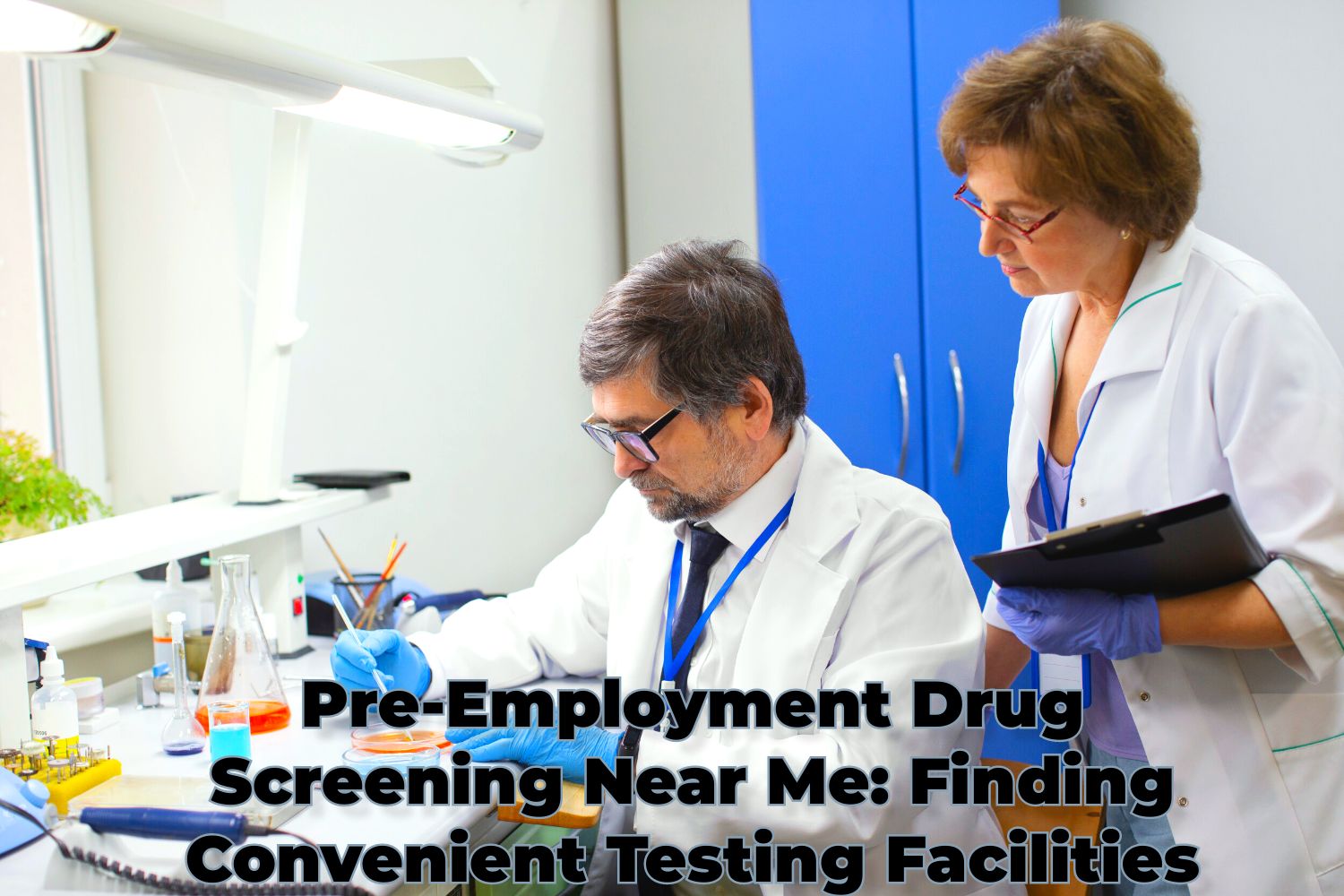Understanding Non-Regulated Drug Screens at Concentra
Last Updated on February 22, 2024 by Lily

Key Takeaways
1. Concentra’s non-regulated drug screens offer flexible testing solutions not governed by specific regulations, allowing employers and individuals to tailor drug testing based on their needs.
2. Concentra provides various testing methods, including urine, hair follicle, saliva, and breath alcohol testing, giving employers and individuals the flexibility to choose the most suitable approach for their drug testing requirements.
3. The ability to customize testing panels allows employers and individuals to focus on specific substances, addressing industry-specific concerns or personal preferences while maintaining flexibility in testing methods.
4. Concentra follows a meticulous process, including proper specimen collection, chain of custody protocols, advanced laboratory analysis, and confidential reporting, ensuring accurate and reliable non-regulated drug screen results for employers and individuals.
Non-regulated drug screens at Concentra offer flexible drug testing solutions that are not mandated by specific government regulations. This article provides a comprehensive understanding of non-regulated drug screens, their purpose, the available testing options, and their significance for employers and individuals.
Non-Regulated Drug Screens
Non-regulated drug screens are drug testing services provided by Concentra that are not governed by specific government regulations. Unlike regulated drug tests that are mandated by federal or state laws, non-regulated drug screens are typically implemented based on employer policies or individual requests. This section explores the definition and purpose of non-regulated drug screens, shedding light on their significance in various contexts.
Definition of Non-Regulated Drug Screens:
Non-regulated drug screens refer to drug testing procedures that are not legally mandated but are conducted voluntarily by employers or individuals. These tests are often designed to identify the presence of illicit substances in an individual’s system, promoting a drug-free environment or addressing personal concerns related to substance abuse.
Purpose of Non-Regulated Drug Screens: a. Employer Perspective:
- Personal Well-being: Individuals may opt for non-regulated drug screens to monitor their own drug use habits and make positive changes to their lifestyle.
- Compliance with Personal Goals: Non-regulated drug screens can assist individuals in adhering to personal objectives, such as maintaining sobriety or participating in substance abuse treatment programs.
- Legal or Legal-related Requirements: In certain legal situations or court orders, individuals may be required to undergo non-regulated drug screens to demonstrate their compliance with legal obligations.
- Professional Licensing: Some professions, such as healthcare or transportation, may require individuals to undergo non-regulated drug screens as part of the licensing or certification process.
Also Read: Metamucil Poor Man’s Ozempic
Non-regulated drug screens offered by Concentra serve a variety of purposes for both employers and individuals. While not mandated by specific regulations, these tests play a significant role in maintaining a drug-free workplace, enhancing workplace safety, and addressing personal concerns related to substance abuse. Whether implemented by employers or individuals, non-regulated drug screens contribute to promoting a healthier, safer, and more responsible environment.
Available Testing Options for Non-Regulated Drug Screens
Concentra offers a range of testing options for non-regulated drug screens, providing employers and individuals with flexibility in choosing the most suitable method for their drug testing needs. This section explores the various testing options available and highlights their procedures and applications.
Urine Drug Testing:
Urine drug testing is one of the most commonly used methods for non-regulated drug screens. It involves collecting a urine sample from the individual and analyzing it for the presence of drug metabolites. This method offers several advantages, including its non-invasive nature, wide detection window, and the ability to screen for multiple substances simultaneously.
Hair Follicle Testing:
Hair follicle testing is a reliable method for detecting drug use over a longer period. During this test, a small sample of hair is collected from the individual’s scalp or body and sent to the laboratory for analysis. Hair follicle testing can provide a historical record of drug use, typically spanning up to 90 days, depending on the length of the hair sample.
Saliva Testing:
Saliva testing, also known as oral fluid testing, involves collecting a saliva sample from the individual’s mouth using a swab. This method is quick, non-invasive, and provides real-time results. Saliva testing is particularly useful for detecting recent drug use, as drugs are typically detectable in saliva shortly after consumption.
Breath Alcohol Testing:
While not specifically a drug test, breath alcohol testing is commonly included as part of non-regulated drug screens. This method measures the alcohol concentration in an individual’s breath and is primarily used to assess recent alcohol consumption. Breath alcohol testing is typically performed using a breathalyzer device, providing immediate results.
Customization of Testing Panels:
Concentra offers the flexibility to customize the testing panels based on the specific needs and requirements of employers or individuals. This allows for the inclusion or exclusion of specific drugs or substances in the testing process. Customization ensures that the drug screen aligns with the objectives and concerns of the testing entity.
Customization of Non-Regulated Drug Screens
Concentra understands that the needs and objectives of employers and individuals may vary when it comes to non-regulated drug screens. To accommodate these unique requirements, Concentra offers the ability to customize drug testing panels. This section explores the significance of customization and how it allows employers and individuals to tailor their drug screens according to specific substances and testing preferences.
Tailoring the Testing Panel:
One of the key benefits of non-regulated drug screens at Concentra is the ability to customize the testing panel. This customization involves selecting the specific substances or drugs to be included in the screening process. Employers can choose from a comprehensive list of substances to create a panel that aligns with their workplace policies and concerns.
Employer-Specific Requirements:
Customization allows employers to address their specific needs and concerns regarding substance abuse in the workplace. For example, some employers may be primarily concerned about opioids, while others may want to include specific prescription medications or illicit substances. By customizing the testing panel, employers can focus on the substances most relevant to their industry or work environment.
Individual Preferences and Objectives:
Non-regulated drug screens are not limited to workplace settings. Individuals may also have their own preferences and objectives when it comes to drug testing. They may want to focus on specific substances due to personal concerns, such as monitoring the use of prescription medications or substances they suspect they may have been exposed to. Customization allows individuals to address their specific testing needs and gain valuable insights into their drug use habits.
Compliance with Industry Requirements:
Certain industries, such as healthcare, transportation, or construction, may have specific drug testing requirements that go beyond regulated standards. Customization of non-regulated drug screens enables employers in these industries to align their testing protocols with industry-specific regulations or guidelines, ensuring compliance and promoting safety.
Flexibility in Testing Methods:
In addition to customizing the substances being tested, employers and individuals can also choose the testing method that best suits their preferences or circumstances. Whether it’s urine testing, hair follicle testing, saliva testing, or breath alcohol testing, the flexibility of customization extends to the testing method employed.
Process and Procedures for Non-Regulated Drug Screens
Concentra follows a rigorous process and adheres to specific procedures to ensure accurate and reliable non-regulated drug screens. This section details the essential steps involved in the drug screening process, emphasizing proper specimen collection techniques, maintaining chain of custody protocols, and employing advanced laboratory analysis methods to ensure accuracy and precision.
Specimen Collection:
Proper collection techniques and privacy considerations are crucial during the specimen collection phase of non-regulated drug screens. Concentra ensures that trained professionals handle this process efficiently and maintain the privacy and dignity of the individual being tested.
Chain of Custody:
Maintaining the chain of custody is crucial to ensure the integrity and security of the collected specimens throughout the entire drug screening process. Concentra places great emphasis on proper chain of custody protocols, which include:
- Documenting the collection, storage, and transportation of the specimens from the individual to the laboratory.
- Labeling the specimens accurately to prevent mix-ups or confusion.
- Implementing secure packaging and sealing methods to prevent tampering or contamination.
- Maintaining a clear and well-documented record of individuals involved in handling the specimens, including dates and times of collection and transfer.
Laboratory Analysis:
Concentra employs advanced testing methodologies and follows stringent quality control measures during laboratory analysis. This ensures accurate and reliable results for non-regulated drug screens. Key aspects of laboratory analysis include:
- Utilizing sophisticated testing methods, such as immunoassay screening or gas chromatography-mass spectrometry (GC-MS) confirmation, to detect the presence of drugs or their metabolites.
- Employing quality control procedures to monitor and validate the accuracy and precision of the testing equipment and techniques.
- Following industry-standard protocols and regulatory requirements to ensure compliance and maintain the highest level of accuracy and reliability in the laboratory analysis process.
Confidentiality and Reporting of Non-Regulated Drug Screen Results
Maintaining confidentiality and ensuring the secure reporting of non-regulated drug screen results are crucial aspects of the testing process. Concentra prioritizes the privacy of individuals being tested while providing accurate and timely results. This section explores the measures taken by Concentra to uphold confidentiality, the procedures involved in reporting results, and the importance of understanding the implications of positive or negative test results.
Confidentiality Measures: Concentra implements stringent measures to protect the confidentiality of non-regulated drug screen results. Key aspects include:
Secure Data Management:
- Concentra employs secure data management systems and protocols to ensure the confidentiality and integrity of test results and related information.
- Access to sensitive data is limited to authorized personnel who require it for processing and reporting purposes.
Privacy Compliance:
- Concentra adheres to applicable privacy laws and regulations, such as the Health Insurance Portability and Accountability Act (HIPAA) in the United States.
- Policies and procedures are in place to ensure that personal health information is handled in accordance with privacy standards.
Secure Facilities:
- Concentra maintains secure physical facilities, including testing areas and laboratories, to safeguard test results and protect individuals’ privacy.
- Access to these facilities is controlled to prevent unauthorized access to confidential information.
Reporting Process: Concentra follows specific procedures to ensure accurate and timely reporting of non-regulated drug screen results. Key considerations include:
Result Verification:
- Concentra conducts a thorough verification process to ensure the accuracy and integrity of the laboratory analysis before releasing the results.
- Quality control measures are implemented to minimize the risk of errors or discrepancies in the results.
Timely Delivery:
- Concentra aims to provide prompt reporting of non-regulated drug screen results to employers or individuals who requested the testing.
- The timeframe for reporting may vary depending on the specific circumstances, but Concentra strives to deliver results within a reasonable timeframe.
Confidential Communication:
- Test results are communicated securely and confidentially to authorized individuals or entities.
- Concentra may use encrypted email or secure online portals to transmit test results and related information, ensuring confidentiality during the communication process.
Result Interpretation: Understanding the implications of positive or negative non-regulated drug screen results is crucial for employers and individuals. Concentra offers support and guidance in result interpretation, including:
Expertise and Consultation:
- Concentra provides access to qualified professionals who can interpret the test results and explain their significance.
- Employers and individuals can consult with these experts to gain a better understanding of the results and their potential implications.
Education and Resources:
- Concentra offers educational resources and materials to help employers and individuals understand the meaning of positive or negative test results.
- These resources may include information on substance abuse, the effects of specific drugs, and the appropriate actions to take based on the test results.
Employer Benefits of Non-Regulated Drug Screens
Implementing non-regulated drug screens in the workplace offers several advantages to employers. Beyond legal compliance, these screenings contribute to establishing a drug-free workplace culture, mitigating safety risks, and promoting overall employee well-being and morale. This section explores the key benefits that employers can gain from conducting non-regulated drug screens through Concentra.
Establishing a Drug-Free Workplace Culture: a. Prevention and Deterrence:
Employee Accountability:
- Non-regulated drug screens promote employee accountability for their actions, including their choices regarding drug use.
- Employees understand that they are responsible for maintaining a drug-free workplace and are aware that drug screenings may be conducted as part of routine testing or following specific incidents.
Mitigating Safety Risks and Promoting Productivity: a. Accident Prevention:
Increased Productivity:
- A drug-free workplace is more likely to be a productive environment, as employees are less likely to experience performance issues associated with substance abuse.
- By promoting a drug-free culture through non-regulated drug screens, employers can maximize employee productivity, reduce absenteeism, and improve overall work quality.
Enhancing Employee Well-being and Morale: a. Health Support and Resources:
Improved Morale and Team Dynamics:
- Maintaining a drug-free workplace enhances employee morale and promotes a positive work environment.
- Employees feel safer and more comfortable working alongside colleagues who are committed to a drug-free lifestyle, fostering a sense of trust, camaraderie, and teamwork.
Employers who implement non-regulated drug screens through Concentra can benefit from establishing a drug-free workplace culture, mitigating safety risks, and promoting overall employee well-being and morale. By creating an environment that prioritizes substance-free practices, employers can enhance productivity, reduce accidents and injuries, comply with legal and industry standards, and contribute to the overall success and satisfaction of their workforce.
What Is a Non Regulated Drug Screen Concentra
Conclusion:
Non-regulated drug screens at Concentra offer employers and individuals the flexibility to conduct drug testing based on their specific needs and objectives. By providing customizable testing options, ensuring confidentiality, and delivering accurate results, Concentra plays a crucial role in maintaining drug-free workplaces and assisting individuals in achieving their personal drug testing goals.
FAQS
What is a non-regulated drug screen Concentra Urgent Care?
A non-regulated drug screen at Concentra Urgent Care refers to drug testing that is not required or regulated by government agencies, such as the Department of Transportation (DOT). These drug tests are typically conducted for various purposes, including pre-employment screening, workplace safety, and personal reasons.
What Regulated Drug Screen at Concentra Consist of?
A regulated drug screen at Concentra typically consists of testing for common substances such as marijuana, cocaine, amphetamines, opioids, and benzodiazepines. The screening process may involve urine or oral fluid testing, and the results are evaluated based on established cutoff levels to determine if any of the substances are present in the individual’s system.



